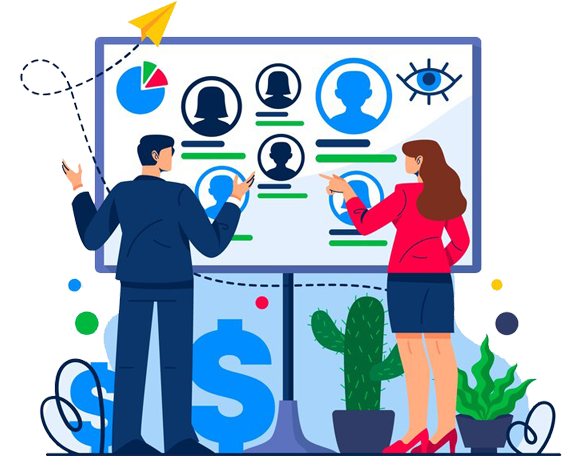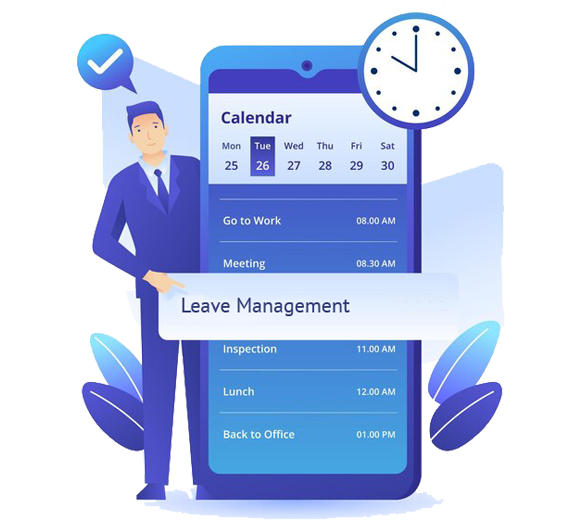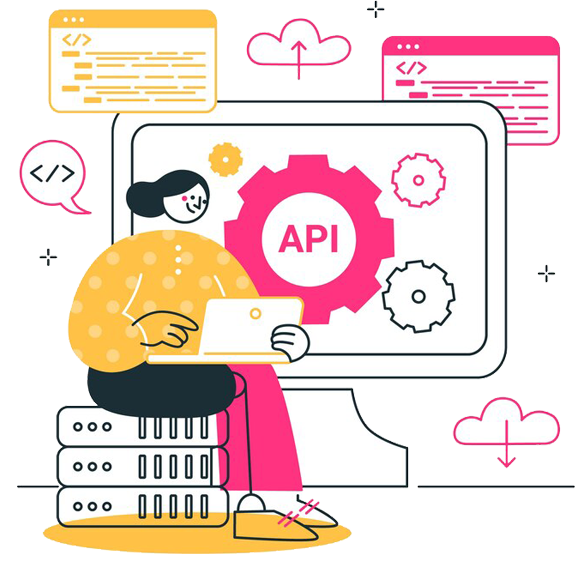
Human Resource Management System Hrms
2nd to 7th pay matrix management Contractual Matrix Management Adhoc Matrix Management

2nd to 7th pay matrix management Contractual Matrix Management Adhoc Matrix Management
Orisys Infotech offers HRMS (Human Resource Management System) development services designed to enhance how businesses and corporations can manage their workforce. We provide bespoke solutions as per your corporation's requirement and standard to simplify and enhance HR processes, enabling you to focus on your most valuable asset: your employees.

User management is an important aspect in any Human Resource Management System (HRMS), allowing organizations to fruitfully handle employee data, roles, and access permissions. Here are the key features of user management in HRMS as mentioned below:
Key Features of User Management in HRMS:
Salary matrix management is an important feature within Human Resource Management Systems (HRMS), assist the progress of organizations to set up their structured and extensible employee compensation. By strengthening customize-able matrices, businesses can define salary plans, grades, steps, and follow guidelines best suit to their human resources needs.A salary matrix serves as a flexible tool for pay scales across various job roles and grades, considering factors such as performance ratings, tenure, market trends, and fulfillment of requirements. It simplifies the process of salary adjustments by making the calculation process more efficient and faster with automation which is based on defined rules such as performance, score or grade levels.

Employee management is an essential feature of any Human Resource Management System (HRMS), designed to systematize and improve the management of an organizationís human resource. With automation, centralization, and integration of major HR functions, employee management in an HRMS enables companies to effectively manage every phase of the employee life cycle from recruitment to retirement.

Leave rule management is an important aspect of Human Resource Management Systems (HRMS) that allows organizations to set, monitor, and control employee leave rules efficiently.
Automating the administration of various leaves including EL, CL, maternity leave, etc. HRMS systems help ensure Meeting labor law requirements while fostering transparency and employee engagement. After leave rule management for various leaves, which are integrated into HRMS system.
Leave Rule Management for Different Leaves like :


Design of attendance management system is a part of HRMS solutions that assists in making the task of handling employee attendance, working hours, and leave accounts easy. The development process includes defining requirements, designing interfaces that are not difficult to operate, and providing for integration with present HR systems without issues.
The Salary Processing Module is one of the key features of modern HRMS solutions, designed to modernize and improve efficiency of payroll operations while ensuring flexibility, adjusted with ease, and maintained correctness.
A reliable Salary Processing Module in HRMS is essential for modern and large organizations, offering versatility, high responsiveness, and operational efficiency. By automating payroll management, businesses can Improve turnaround time, reduce costs, and create a positive work culture, are few of the key drivers of long-term success.

The Periodic Increment of Employees module of an HRMS is intended to automate and simplify the process of salary increment against performance appraisals, tenure, or company policies.

This module makes it easy to what is at other times a time-consuming and arduous process for HR staff, particularly during the yearly appraisal cycles when several employee increments must be processed at once.
The Performance Appraisal (PAR and CCR) module is an essential part of HRMS systems, which leads to automation and simplify the evaluation of employee performance within the organization or corporation.
PAR (Performance Appraisal Report) and CCR (Confidential Character Report) procedures are essential in measuring individual employee contribution, giving feedback, and enhancing employee performance goals with organizational goals. This module helps to create a culture of improvement while maintaining transparency in meeting organizational standards in appraisals.

The development of a pay fixation module within a human resource management system(HRMS) is essential to automate and streamline employee salary adjustment processes based on various pay revisions.
This module facilitates the calculation and implementation of pay adjustments resulting from promotions, increments, and other revisions in salary structures, ensuring strict compliance to both legal and corporate policies.

-- Pay Matrix Change
-- EB/TBA/RACP/MACP/ACP
-- Stepped Up
-- Antedated
-- Contractual Matrix Changed
The Terminal Benefit Settlement module is intended to automate the processing and payment of terminal benefits to staff members at retirement, resignation, or other reasons for leaving the organization.
This module automates the complex process of calculating, sanctioning, and releasing terminal benefits like gratuity, provident fund, and other retirement-related compensations.

Holiday Management: Holiday Management enables corporations and organizations to set and manage official holidays so that employees know the non-working days and can plan their leaves well in advance.
Legal Heir Management: This feature facilitates organizations in keeping accurate data of employees' legal heirs, which is vital in processing benefits and claims on retirement, death, or other incidents.
Gradation List: The Gradation List feature offers a structured outline of employees by their ranks or grades within the company, supporting better workforce planning and promotions.
Incumbency Chart: An Incumbency Chart is a visually representation of present occupation held by employees within the organization, supporting HR with succession planning and detection of potential leadership gaps.
Circular/Notification Management: Circular/Notification Management: This module enables HR to create, send, and track important circulars and notifications to meet the needs of all employees to receive timely notifications regarding policies, procedures, and company updates.
E-Dispatch of Letters: E-Dispatch of Letters facilitates the process of sending formal letters to employees, making it more efficient and ensuring important documents are sent to the employees early and securely.
Salary Component Rules: This feature allows organizations to define various salary components such as basic pay, allowances, and deductions based on compensation policies and for proper processing of payroll.
Internal Audit with Audit Report and Audit Recovery Management: Internal Audit feature helps organizations perform periodic audits of HR operations, create detailed audit reports, and manage recovery actions for any variance found.

Departmental Proceeding (DP) with DP Report and DP Recovery Management: This module enables the management of disciplinary measures against employees, such as following up proceedings, creating reports, and introducing recovery measures if required.
Suspension of Employees: The suspension of employees feature allows HR to manage the suspension process proficiently, including documenting reasons and tracking the suspension's duration.
Voluntary Retirement/ Death Case of Employees: Involving voluntary retirement or employee death, the module provides a step-by-step guide to handle such cases and make sure that all benefits are handled with comfort.
Advance to Employees with Advance Recovery Management: By using this option, organizations can offer salary advances to their employees and establish clear recovery plans that include the ability to deduct repayments from future salaries.
Bonus to Employees: The Bonus component make the allocation of bonuses simpler by taking advantage of performance metrics or organizational profitability, leading to focuses on greater employee motivation and satisfaction.
House Rent Declaration Management of Employees: This facility clear the way of employees to declare their house rent details for tax purposes while making it easy for HR to manage deductions related to it.
Property Statement Management of Employees: Property Statement Management helps organizations maintain records of employee-owned properties for following rules and standards in accordance with regulations and benefits eligibility assessments.
NDC and LPC Generation: The NDC (No Dues Certificate) and LPC (Leave and Pay Certificate) Generation feature automates the creation of necessary documents required for employee clearance and benefits, making it certain that all dues are settled before an employee exits the organization.
Payroll Management: Payroll Management encompasses the entire process of calculating employee salaries, deductions, and benefits, making the assurance of timely and accurate compensation while maintaining to regulatory conformity to rules and guidelines.
Disbursement of Salary: This functionality facilitates the seamless transfer of salaries to staff member' bank accounts, making it a necessity that payments are made on time and in accordance with the defined payroll schedule.
Service Book of Employees: The Service Book feature maintains a comprehensive record of each employee's service history, including appointments, promotions, transfers, and other significant events, which is crucial for managing career progression and benefits eligibility.

Banking API Integration to mark employees as Beneficiary and to instantly transfer Salary from Own Office Account to employees Account.
Digital Signature Certificate Integration to generate Digitally Signed documents.
SMS Gateway Integration to send SMS on different instances.
Bio-Metric API Integration to integrate Bio-Metric devices to HRM System to capture IN/OUT time of employees.